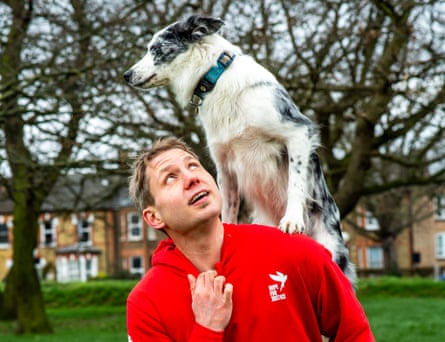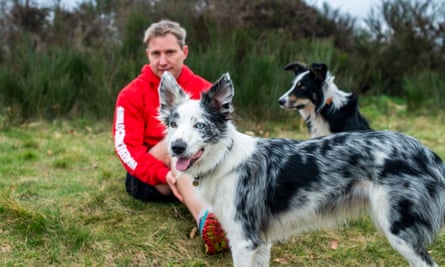
The resilience secret: 13 ways to stay strong and active – from the man who runs a marathon a day
Every morning this year, Aaron Robinson has arisen before dawn and run 26 miles before work. He explains how to turn an intimidating exercise plan into a simple habit
By the time you read this, Aaron Robinson will – barring disaster – have run his 75th marathon in 75 days. Aided by his two pace-setters, Inca and River (his border collies), Robinson will have got out of bed around 3am, and completed 26 miles. He’ll probably do the same tomorrow, and the day after that.
People always ask how many marathons he’ll do, he says. “I don’t know. I’d love to say, especially for fundraising, ‘I’m doing X amount.’ But we’re just doing it day by day. It depends on the dogs and how they feel.”
But how does he feel? “Doing previous ultra-marathons, the second half you’re often running on ‘tired legs’. I feel like every run now I’ve done on tired legs,” he says. Robinson, 40, who lives in east London, ran 200 miles in three days last year and he has completed many other ultra runs. The daily marathon has been tough, but, he says, it’s also “one of my happiest times of the day, really. I’m an introvert – I love running on my own. It’s my happy place.”
The 3am start is a necessity, so that he can make it to work on time. Robinson works for the charity Hope for Justice, which campaigns to end modern slavery and supports victims, and for which he is raising money and awareness. “Trying to fight modern slavery can feel overwhelming,” he says, “but each of us can do something, however small.”
Starting in the cold and dark of winter was no deterrent. “I just wanted to do it,” he says. “I’m planning on doing this for a long time, so I’m going to go through all the seasons.” It probably helped to start in the harder months, he adds, so that now he is appreciating the earlier dawns. At the weekend, he had a lie-in “until 5am, and I ran most of the time in sunshine. That was the fastest run I’ve done. It just feels more natural.”
Whether the rest of us need a push to start exercising, are taking on a new challenge, or want to operate with more grit, determination and resilience, what can we learn from Robinson? He sounds alarmed at the question. “I don’t consider myself an expert,” he says cautiously – and his extreme schedule wouldn’t be recommended by experts. “I can only say what works for me.” The good news: it includes crisps.

Be inspired by others
Robinson had been following the consecutive marathon women’s world record attempts. “It changed hands several times in a short space of time,” he says. “Seeing them do it – it just really appealed to me.” And there are more who have achieved similar feats: Gary McKee ran a marathon every day in 2022, raising more than £1m for Macmillan Cancer Support. Robinson wanted to raise money for Hope for Justice, as he has with previous challenges. “A lot of charities are going through a tough time at the moment with cost of living and lack of donations.” He also gets a lot of motivation from knowing he has inspired others – people have told him they’re now training for a 5k. “That means a lot.”
Create a habit
People tell Robinson that he must have amazing willpower to get himself up at 3am every morning and go out, whatever the weather. “Not really, actually,” he says. “Maybe you use willpower at the start, but after that, you just keep doing the same thing and it becomes easier. Habit is a really powerful thing for me, probably more powerful than willpower.” It would be harder to stick to, he thinks, if he set himself the challenge of running three or four marathons a week. “I never have a choice. I never think: do I do it today, or do I not? I have to get up. Once you’re there, and you’ve run the first mile or two, it’s actually fine. The hardest part is just starting.” A daily marathon, or even daily intense exercise, is not necessarily healthy, but fitting in some sort of non-negotiable movement every day – a walk, or yoga, or some strength training – is.
Be prepared
Robinson charges his phone, head torch and head camera the night before, puts out his running clothes and packs his energy gels, water, dog snacks and a packet of crisps. “I do exactly the same thing each night. It’s definitely a lot easier.” It’s the same reason he runs a more or less identical route each time. “There’s a lot of energy in working out where to go. Sometimes we go a different way but I don’t really want to get lost when it’s 4am.”
Jo Wilkinson, running coach and former elite athlete, advises creating a routine, and setting a reminder on your phone half an hour before your run. “If you’re working from home, put your running kit on in the morning, even if you’re going to go for a run in the evening,” she says. “If you’re out at work and you’re coming home, do not sit down. That’s the worst thing you can do, because once you sit down, it’s really hard to get up again. Come in, get changed, go out again. Your sofa will suck your motivation from you as soon as you sit on it.”
Prioritise sleep
Robinson says sleep is one of the most important things to him, and he tries to make sure he gets at least eight hours. This means going to bed at 7pm – “it’s bad for my social life” – but he says it’s worth it because sleep is “probably the No 1 factor in how well I’ll perform. I’ve had 10 hours of sleep twice and both those times I got the fastest times afterwards.”
Eat well
Robinson isn’t exactly the ideal to follow here. He doesn’t give much thought to his (vegetarian) diet, and doesn’t count calories – he needs approximately 6,000 a day, but he says he takes that as a ballpark figure and eats when he’s hungry. “I find that generally eating healthy foods is better than junk, but I’ve also found that eating crisps is quite helpful because they’re high in salt, and replace the sodium you lose when you sweat.”
Sarah O’Neill, a personal trainer and nutritionist, says: “It’s even more important to make sure you’re eating healthily, and you’re giving yourself the full complement of vitamins and minerals, and healthy fats. Exercise is great, but it’s still a stressor on the body.” Don’t forget you need extra water, too. “For every hour you exercise, you’re meant to have an extra litre of water.”
READ RELATED: ‘Demand interestingness’: Thomas Heatherwick rails against boring buildings

Enjoy well-earned rest
Robinson doesn’t take rest days – at least during this challenge – but O’Neill cautions against following his example. “People often make the mistake of not factoring in rest, but that’s when your muscles can repair and build, so it’s a really important piece of the puzzle,” she says. “Over-training can cause repetitive stress which can then lead to injury. Everybody’s a little bit different: some people can work out every day, but they’ll use something like yoga as their rest session. I would say it’s good to have at least one clear rest day a week.”
Set a goal, or find a purpose
All of us will have moments where we just can’t be bothered to get out and exercise. A purpose or goal can help. For Robinson, it’s raising money for people who are “forced to work in appalling conditions, forced into sexual slavery, and they literally can’t run away”. Running in the cold and rain, however unpleasant, is “nothing compared to what they’re going through, so putting that in perspective changes my mindset and helps me,” he says.
Your goal could be simply to engage in regular exercise, but be specific about the number of days. Motivation can be developed, says Andy Lane, professor of sport psychology at the University of Wolverhampton. Believe you can do it, try it and get confirmation that you can. That, he says, “is massive. See what positive steps you took on the way to get there.”
Find a training partner
“If you arrange to meet somebody, you don’t want to let them down. So find a friend to go out for a run with,” says Wilkinson. It doesn’t have to be extreme: arranging a regular walk with a friend is a good first step, but she also advises joining a group such as a local running club. “They cater for a range of abilities, from super-speedy people down to beginners. They absolutely are for everybody.” Or you could set up a WhatsApp group or sign up to any number of training apps to keep you accountable to others.
For Robinson, his two dogs are his best motivators. “They’ve got so much energy. As soon as we come back from the marathon, they still want to play.” He has been a bit stung by some comments online that it is cruel to run a daily marathon with dogs. “For some dogs, it probably is, but if you’ve got a working breed, anyone who owns a border collie knows they’ve got so much energy. They love running; they love doing things with you and they like you giving them tasks, so we play a few games along the way as well. If they see a squirrel, they’re off chasing it.”
The challenge has improved their relationship with him, he says. Inca and River get him up in the morning, either with a paw or, if that fails, by sitting on him. “It’s a nice, bonding thing to do with your dogs. We feel like a bit of a pack.” The only thing that would stop the daily marathons, he says, is if one of them was ill or injured. “It’s the three of us doing it or none of us.”
Don’t go too hard
A daily marathon is extreme, but Robinson wasn’t starting from zero. For many of us, starting with a daily walk would be ideal. “If you tried to make every session very hard, it would be gruesome and even the fittest would find that extremely tough,” says Lane. Robinson may be running a marathon a day, but at least, says Lane, “he generally goes at the same speed”. People starting out often don’t get the levels right, “and don’t pay attention to what can be the very negative effects of pain that come with intense exercise. The idea that it has to be brutal for you to improve is simply not true. The most important thing – and Aaron’s doing this – is the consistency.”
Be realistic
Most of us are not going to get up at 3am to run for five hours, but don’t take an all-or-nothing approach. “Say: ‘Can I fit in 10 minutes of exercise most days of the week?’” suggests O’Neill. “When I’d just had my children, I realised I wasn’t exercising because I felt like it had to be a big session. Then I thought: ‘I’ll just do what I can.’ It’s finding what suits you and where you’re at, physically or in your life. If you don’t adapt your expectations, that’s when training falls off the map.”
Make it fun
Exercise can be boring. Robinson sometimes listens to podcasts but he often embraces the long runs as a form of meditation, and zones out. “You lose track of the mileage,” he says. And make the most of exercising outdoors: “What’s that phrase? You can never step in the same river twice. I feel like I never do the same run twice, because I’m different, the dogs are different, the weather’s different, the seasons are changing. It doesn’t feel boring.”
Choosing something you enjoy – dancing, roller skating, trampolining – will probably help you stick to it. “The idea that going on the treadmill for half an hour will be fun? It’s nonsense,” says Lane. “It’s enjoyable when you’re out in nature, and it’s nice scenery, or when you’ve got nice music on, or you’re walking or cycling with somebody. You can create those scenarios. You can also identify what makes it agony. Typically, for most people, it’s going too hard, too early.”
Take it step by step
Robinson isn’t particularly interested in running fast. A marathon takes him about five hours each morning. “In that time, you’re going to get moments where it feels great, and moments where it’s tough,” he says. “Sometimes from nowhere a second wind will come and you’ll feel amazing, so it’s just about hanging in there. OK, you don’t feel great now, but maybe in 10 miles, it’ll be fine. Sometimes it’s literally just getting to the next mile, the next tree, the next bench and focusing on that rather than trying to get to the end, because that might be quite a long way away.”
O’Neill agrees. She once ran 12 marathons in 12 days, and says she found it hardest when, “we looked ahead too far. You have to go one bit at a time, breaking it into small chunks and only look at the piece ahead of you.”
Robinson says that when you’re hitting the miles that are the hardest, “and you don’t think you can get through, it makes it even more rewarding to think: if I do get to the end, what would that mean? When I stop and walk for a bit and think this might be the last [marathon], then I push through – those are the most rewarding runs. For me, suffering and pain are not necessarily bad in small, manageable quantities. It’s an opportunity to prove yourself.”
Focus on the mental rewards
Robinson has never got on with platitudes such as “believe in yourself”. “I’ve always found that a bit meaningless,” he says. “What if you don’t believe in yourself? It’s often talked about like something you just switch on, like a light switch.” He says he has developed psychological resilience from his running. “I’m more confident. If I can do this, then [how hard can] a presentation I have to give at work be? I don’t worry about it as much.”
Source: Health & wellbeing | The Guardian





